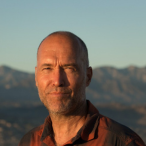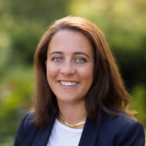Sylvia Metayer (H.86) was Sodexo’s Chief Growth Officer from 2019 to 2022. She is a founding member of SoTogether, the Group’s women network, and Executive sponsor of Pride, its LGBT network. Sylvia sits on the Boards of Aéroports de Paris, Keolis, Page Group, and Animalcare. She is also a member of the International Strategic Advisory at HEC. Find Sylvia Metayer’s article in the Harvard Business Review France (in French): "L’innovation, un levier de croissance mais surtout un enjeu humain."
Pascal Stefani (H.88) spent 25 years working in private equity, mainly at Advent International. He’s now a philanthropist and Business Angel in environment, education, and inclusion. He is involved with Ashoka, a pioneer network of social entrepreneurs, an investor, and a Board member of social enterprises, including Label Vie, LiveMore, and Wu&Cie. Hence, he is trying to help social enterprises scale up and bring systemic changes.
Karine Rougé (H.04) is CEO of Veolia North America’s Municipal Water services, managing one of the world's biggest municipal water distribution services. Previously, she was a director for First Sentier Investors, a leading global infrastructure investor, and worked for Suez for 11 years.
In your opinion, what is the role of business in the transition to the ecological and social paradigm?
Sylvia Metayer: Businesses have a key role to play in this transition: they have scale, they have means, they are a key interface between consumers and supply chains, and they unite geographies. And they very often have active employees who want them to stand for a better world.
Pascal Stefani: In my opinion, business is a key element of the ecological and social transition. Depending on their transformation, businesses could accelerate the transition or make it impossible. The transition will fail if the business stays mainly driven by profit-making, growth, and short-term returns.
Businesses are a key driver of both the problem and the solution.
Karine Rougé: Businesses are one of the largest forms of human organizations. As such, they are a key driver of both the problem and the solution. The current paradigm of for-profit businesses is relatively new in its construct when we look at the history of organizations. It is by no means set in stone, and I am convinced that we are seeing the emergence of a new paradigm where performance will be multifaceted and not only financial. Our current situation poses an existential threat to organizations as they are, they are forced to take that into account for their own survival.
What types of actors do you think play the most important part in this new paradigm?
Sylvia Metayer: No one is more important than the other: if we start to assign importance, we run the risk of waiting on one another to do something. We must all act in a coordinated and informed way.
The transition also requires a dramatic change from investors to balance impacts with financial returns.
Pascal Stefani: The new paradigm requires ALL types of actors. Of course, privates are key but they will not change fast enough without the pressure from citizens (as customers and employees) and without changes in regulations and public policies (also driven by citizens votes). The transition also requires a dramatic change from investors to balance impacts with financial returns. Social entrepreneurs are also key actors as they bring environmental and social innovations to business.
Karine Rougé: I see these actors as various types of coalitions of individuals with different means of action. Private actors have capital and ability to invest, public actors have that ability to a lesser extent but can form policy. Investors and citizens are influencers of the organizations in which they have a stake. So, I think everybody can play an equal role, but with different tools and time horizons.
What is the role of purpose or meaning at work in elaborating a business that is respectful of the environment and people?
Sylvia Metayer: We spend so much of our time at work that if there is no purpose or meaning to it – then really, what is the point? Lack of meaning at work leads to disengagement and flight of talent which, in turn, means business failure. The difficulty is to align individual purpose and meaning with corporate purpose and meaning. If they are authentic, environmental and social stands taken by corporations can connect everyone and resonate. Who can say they do not want a better quality of life in the future for themselves and future generations?
Pascal Stefani: Being aware that already 6 planetary boundaries out of 9 are transgressed with consequences for human life and social justice, it’s high time to change for a regenerative economy. This could not be done without purpose and a long-term view. Without a purpose, why should we change and sometimes give up business lines or practices? Without a common purpose, how could we implement change with all stakeholders?
How could we implement change with all stakeholders without a common purpose?
Karine Rougé: It is very human to strive for a purpose broader than oneself. Whether it is spiritual, religious, or community-based... I think there always has been purpose in work, before companies started putting efforts in writing them explicitly: for some it was the sense to contribute to a broader effort for humanity, for others it could be their contribution to the efforts of their team. The difference now is that more and more leaders have understood the need to pay attention to something other than financial performance. It was as if we were trying to counteract the 1980s and the Reagan of Milton Friedman.
That commitment from leaders and institutions should help create more trust in the authenticity of the company's purpose. I can say that for myself, when I joined Veolia, it was a key decision driver to sense a lot of commitment to the purpose at very different levels of the organization, from the CEO to field workers. And in my day to day, it serves as a real compass. Often, we ask ourselves, “Is it the right thing to do?” And in this question, the underlying idea is whether we are aligned with our purpose as a company.
How has purpose helped or driven you to act in the companies you have been committed to?
Sylvia Metayer: Very early on, I acted on the fact that I wanted to work in a company that was “good” – this was before purpose was a buzzword. I summed it up by saying I wanted work I wouldn’t be ashamed of in front of my children. And so I have always worked for such companies and frankly walked out when they weren’t true to their purpose. I guess I was taken aback my first day at Sodexo working on the frontline when someone told me, “I do this work so my children don’t ever have to do it,” because it was the negative of my own wishes. I then understood that I had to go from working in a “good” purposeful company to being an agent of change and good for others. As a leader, I had to embody the purpose of the company, not just benefit from it, and ensure the purpose was alive and thriving.
As a leader, I had to embody the purpose of the company, not just benefit from it, and ensure the purpose was alive and thriving.
Pascal Stefani: I really started my personal path looking for purpose in my job in 2011. I wanted to better align who I was, my values, and my job. I started working on myself (être soi) and working pro bono for social entrepreneurs, getting more familiar with environmental and social issues. In 2016, I quit my job in finance to work fully with social entrepreneurs and help them bring social and environmental innovations to our economy and society.
Karine Rougé: As the US's leading water and wastewater operator, serving 20 million Americans, we have a great field of action. While renewable energy isn’t necessarily asked for by our customers (remember that gas is very cheap here…), we are investing in biogas production from biosolids and microgrids to improve the energy efficiency of our plants. That’s by no means easy, but everybody is excited to do it because it is aligned with our commitment to the environment and our social commitments, as ultimately, this will lower costs for communities.
What difficulties do you see when it comes to embodying purpose in a company?
Karine Rougé: It is easier and faster to lose trust than to gain it. One decision by a manager in the company that isn’t aligned and trust can be lost for this group of people. There are also conflicting objectives. In my biogas example, sometimes we have to decide not to do it because it would be too costly for us and erode value for our shareholders, who remain an important type of stakeholders. There is no perfect decision-making process around such a question, but the ability to build a dialogue around it is key.
Pascal Stefani: Companies have been managed with a view to making profit and only profit. Transitioning to the new paradigm is challenging because of skepticism, fear of change, and uncertainty about a new model. Getting alignment and changing mindsets are difficult. This requires a change in culture, practice, and organization. Of course, leaders need to be formed and trained for purposeful leadership, but also middle management.
And you, what role can you play to ensure that private actors, public actors, or citizens play a lasting positive role?
Sylvia Metayer: By first ensuring that in everything I do, I myself am playing a lasting positive role. This informs all my dealings quite naturally, as well as my choices of activities.
Pascal Stefani: I’m trying to help social enterprises scale up and bring about systemic changes. This requires building bridges between social business and business and finance for a larger impact. It also requires changing laws and regulations. I’ve been doing that mainly in environment, inclusion, and education.
Karine Rougé: I lead a private business dealing with municipalities. We like to say that we are a B2C2B organization, as many of our topics are pushed by citizens to their elected officials. So I will say that education is essential, especially for a topic as little known by citizens as water.
Why do you donate to research and education on purpose?
Sylvia Metayer: Education is the biggest lever for change, and access to education is the biggest lever for inclusion. Research is what will funnel innovation for change, and all this requires means and funds.
Pascal Stefani: I started donating to the HEC Foundation a long time ago with the goal of giving back. I was specifically interested in the Chance Equality program. I was immediately convinced when Hubert Joly created the Purposeful Leadership Chair with HEC. As a leading Business School and Grande Ecole, HEC has to train new leaders capable of tackling the new paradigm.
In topics like purpose, it is easy to see this as a communication exercise, while I believe this is a whole new education for leaders that is required.
Karine Rougé: I believe there is value in understanding better how organizations, their management, and their governance should evolve to meet the requirements. In topics like purpose, it is easy to see this as a communication exercise, while I believe this is a whole new education for leaders that is required.
What initiative(s) at HEC do you find the most inspiring and impactful so far?
Sylvia Metayer: The scholarships program, the companionship initiative1, the Impact Company LABs “data initiative”2, and all the DE&I initiatives.
I'm grateful that HEC has decided to invest in research and teaching, as both are necessary to form new leaders and search for business alternatives.
Pascal Stefani: I’m grateful that HEC has decided to invest in research and teaching, as both are necessary to form new leaders and search for business alternatives. I strongly believe that we need to act now without waiting for a new generation of leaders at the heads of companies. So, I’m glad that HEC is already working with corporations and start-ups to implement changes that will impact the new generation.
Karine Rougé: I think the school is doing a wonderful job weaving purpose leadership into its core curriculum, starting with much more attention to developing students in their entirety and not only their left brains. The focus on a different set of skills, empathy, listening, and intuition, to complement the ones that HEC students already have, is a very important differentiator.
*Hubert Joly, former Best Buy chairperson and CEO and now a senior lecturer at Harvard Business School, created the Joly Family Purposeful Leadership Chair in 2018, along with HEC Paris and the HEC Foundation. Joly has been recognized by Thinkers50, and acknowledged as one of the top 30 CEOs globally by Barron's. Rodolphe Durand, Professor of Strategy and founder of the S&O Institute, is its academic director, and Cécile de Lisle, its executive director. The chair allows several professors and Ph.D. students to investigate how meaning at work affects performance while addressing environmental and social issues. Learn more in this HEC Talks’ summary.
1The Companionship Program is an initiative of the Purpose Center in collaboration with HEC Alumni (120 students and alumni are involved in 2024).
2The goal of the “data initiative” of the Impact Company LAB is to generate novel evidence of what sorts of sustainability-related business practices actually work, and the ones that don’t work. There, researchers leverage underutilized existing databases and create new databases.









